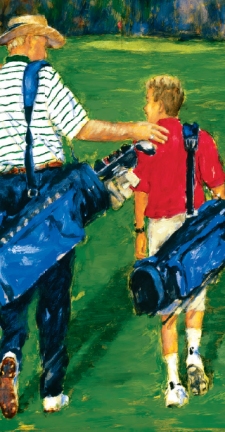Winning Words: Using Praise To Make Your Competitive Golfer Bulletproof
 I want my son to be a confident person. Apart from keeping him safe, I believe that giving him confidence is the most important job I have as a parent. Now, my son is only two years old, but what I’ve found is that much of the research on what helps promote confidence in my son is also applicable with my competitive golfers. More specifically, how we praise our players can have a tremendous impact on their confidence level on the golf course.
I want my son to be a confident person. Apart from keeping him safe, I believe that giving him confidence is the most important job I have as a parent. Now, my son is only two years old, but what I’ve found is that much of the research on what helps promote confidence in my son is also applicable with my competitive golfers. More specifically, how we praise our players can have a tremendous impact on their confidence level on the golf course.
DON’T: Avoid praise that is too general
“Good job” might just be the most harmful phrase in sports. At any golf practice, you’re likely to hear this kind of very general praise going around: “Nice shot”… “Great putt”… “Good up and down.” Oftentimes, this kind of general praise is handed out by coaches or parents without even thinking about it. But, at best, this kind of general praise will have no effect on your players’ confidence. At worse, it may actually harm it. Research shows that children as young as my son can already differentiate between praise that is genuine and praise with no real meaning. If your players feel like you are handing out praise all the time for no particular reason, they will not be able to tell when they’ve actually done something worthy of genuine praise.
Additionally, “good job” gives your player nothing to build on. If you see a behavior or action or decision that you want your player to repeat, you will need to go beyond “good job.”
DO: Be specific with your praise
Every year at golf tryouts, I get kids who want to join the team, but have no real golfing talent. Sometimes, I get kids who have never played golf before in their lives. I have learned that the first day of practice is critical. A kid who feels like he failed or embarrassed himself will most likely not return the next day and may never play the game again. If you watch a player shank ten balls in a row, then tell him, “Good job,” and move on to the next player, how do you think that kid will feel?
Instead, your praise is going to need to be specific. Often, you will need to praise the effort rather than the result. Furthermore, using a “compliment sandwich” will allow you to target what needs to be improved while not devastating your player’s confidence:
Compliment: “Your grip looks really solid, Ben. I can see you’ve been working on that.”
Correction: “Try to keep your head quiet through impact to avoid those shanks.”
Compliment: “And, your tempo is just right. Keep that up.”
This exchange is much more meaningful to your player, because it meets them where they are in their game and gives them the appropriate tools to improve. In addition, using your player’s name while giving specific praise is extremely effective, because it allows a player to feel that your observations are genuinely tailored
to their skill-set.
DON’T: Avoid exaggeration
“Ben is amazing. He’s going to be the next Tiger Woods and should probably be playing professionally already.”
I often deal with parents who want to know how their kid is doing on the team, and this kind of praise might be an easy way to keep them from interfering too much. But, exaggeration of this variety is really very harmful. First, just like with the general praise, your player will most likely know that they’re not really deserving of this kind of praise and can feel undermined by it. They will likely put less weight in praise that you give them in the future. Worse, if they actually believe the praise, it may create a sense of entitlement and accomplishment that is undeserving of their actual abilities.
DO: Make your praise positive
“Great job not three-putting.”
“Finally, he hits it straight!”
“Wow, I guess even YOU can make a par once in a while!”
Remember, your job is to instill confidence in your players. This type of negative praise is not helpful and can turn a positive moment for your player into a moment of shame or embarrassment. It can take away from their accomplishments, even if it’s meant as a joke. Keep your praise positive and don’t be a bully to your players. Even the most light-hearted teasing can have negative consequences to a player’s confidence, so steer clear of negative feedback.
We all know how mental the game of golf is. A player who is technically sound but lacks confidence in their ability will rarely succeed to expectation. Employing genuine specific praise in appropriate moments is the key to producing confident, competitive golfers.




